外研七上Module 5 My school day重点归纳与解难探究(含答案)
文档属性
| 名称 | 外研七上Module 5 My school day重点归纳与解难探究(含答案) | 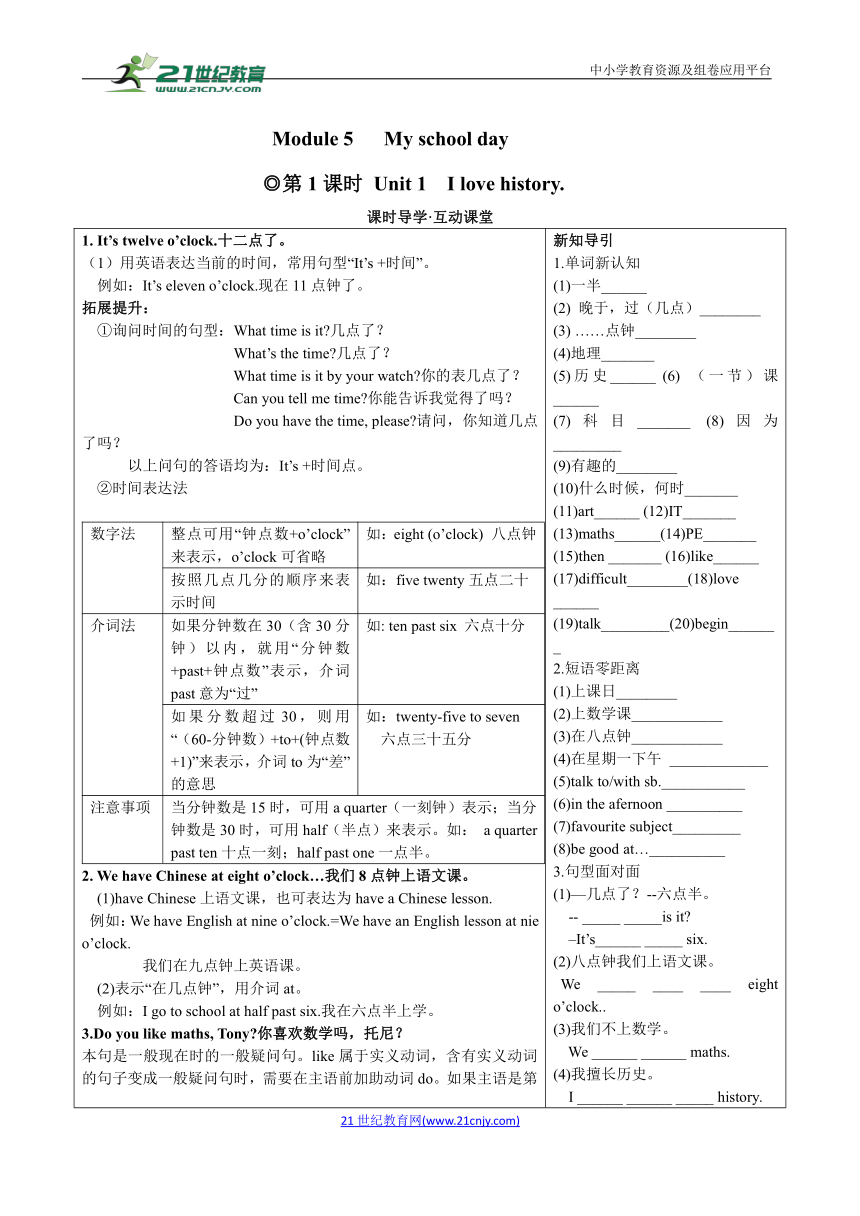 | |
| 格式 | zip | ||
| 文件大小 | 1.3MB | ||
| 资源类型 | 试卷 | ||
| 版本资源 | 外研版 | ||
| 科目 | 英语 | ||
| 更新时间 | 2018-10-24 07:13:39 | ||
图片预览

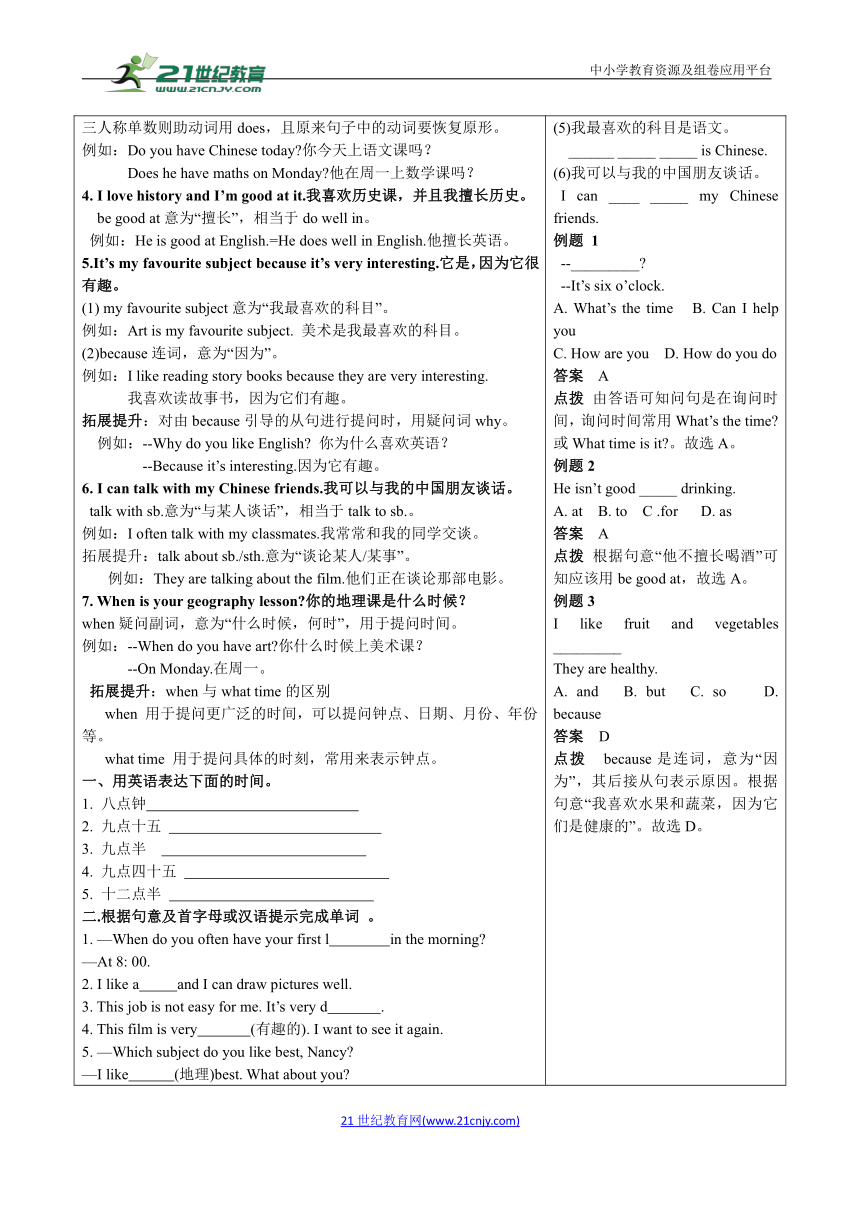
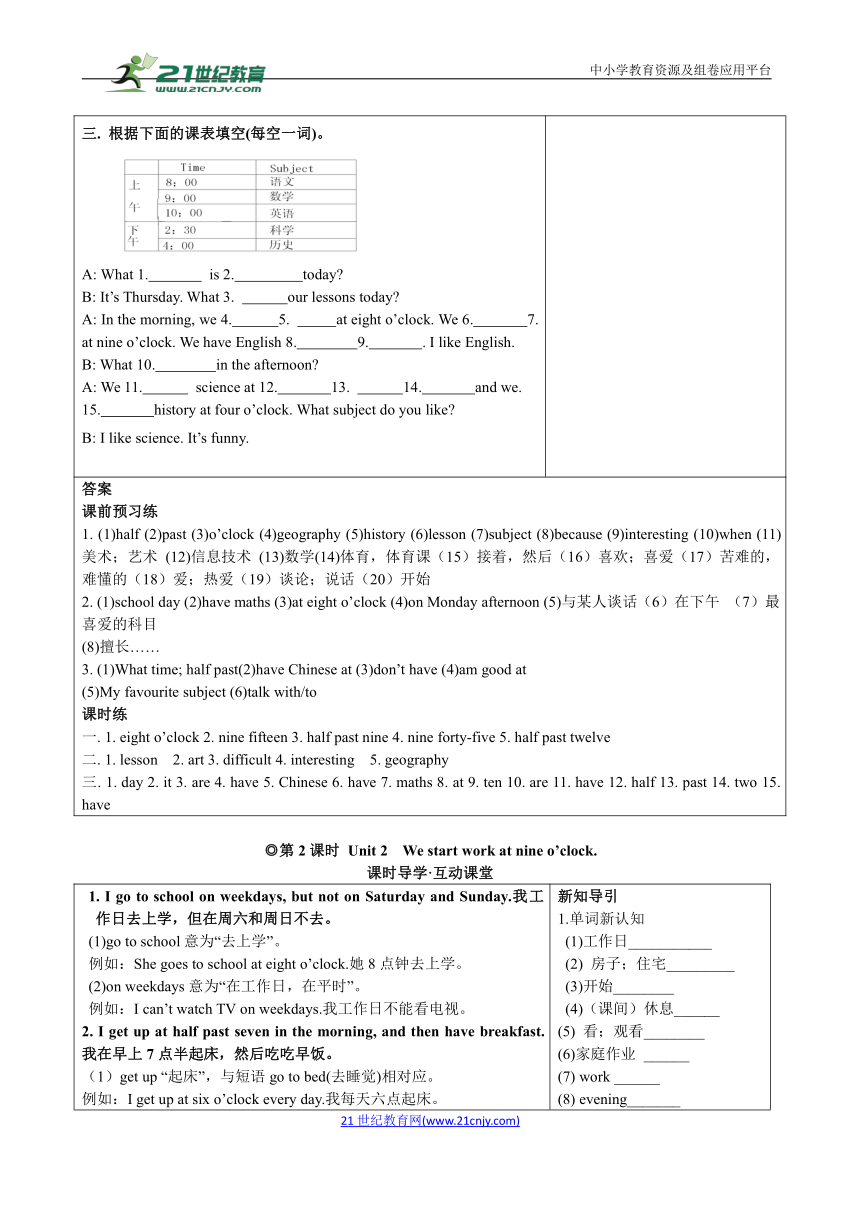
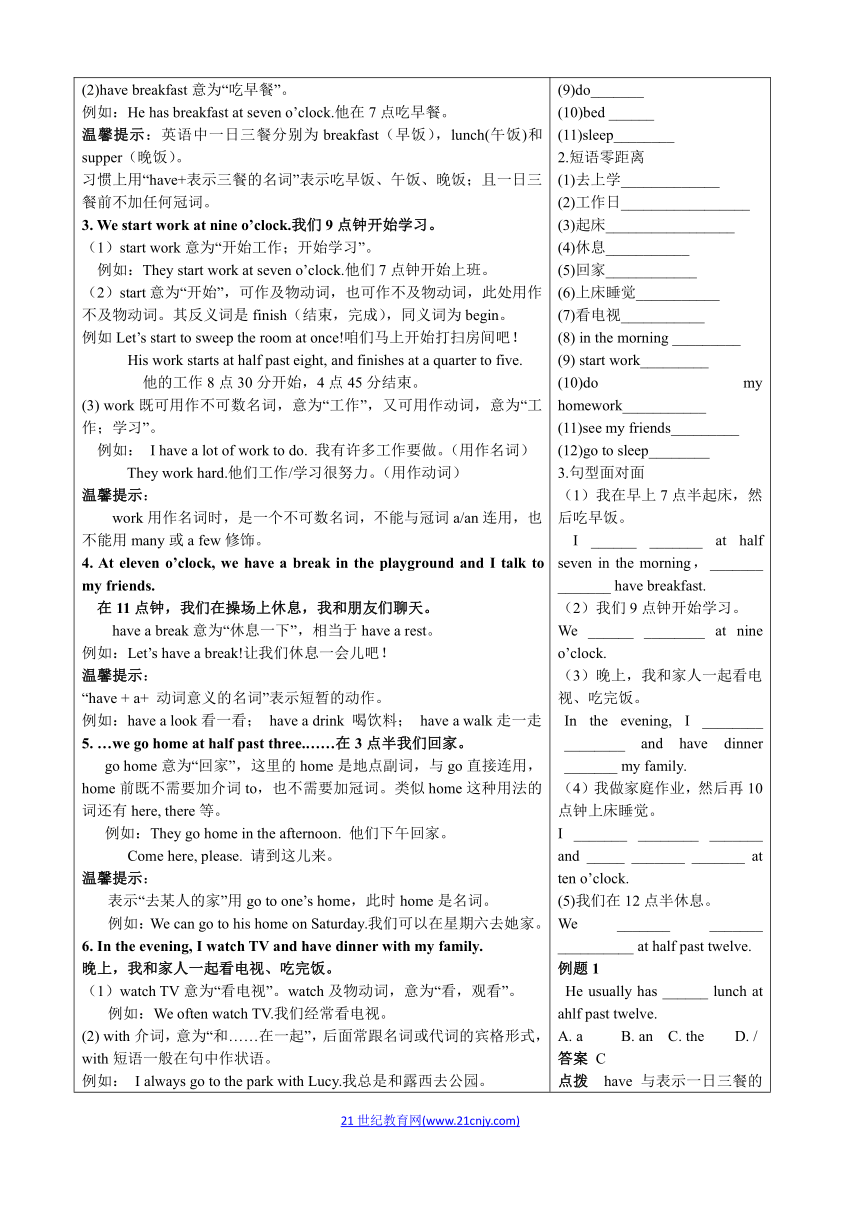
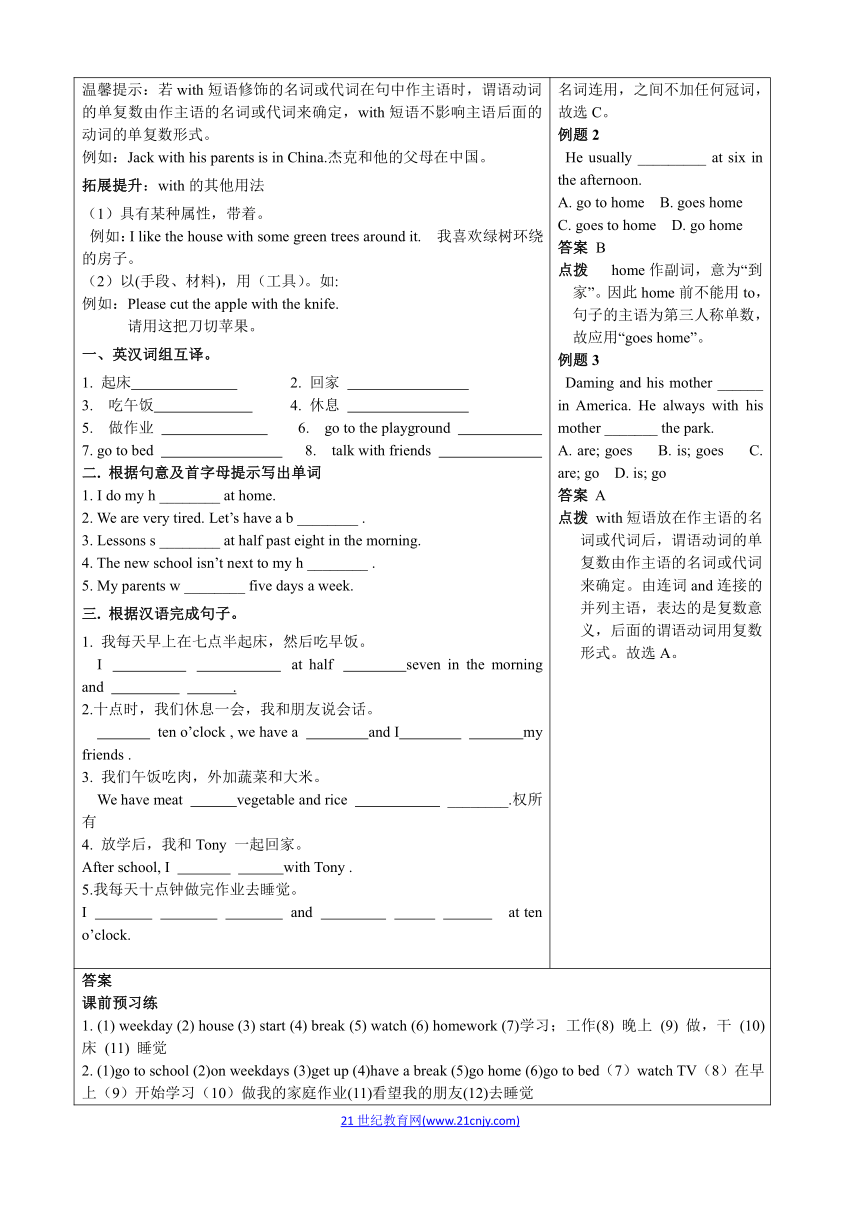
文档简介
中小学教育资源及组卷应用平台
Module 5 My school day
◎第1课时 Unit 1 I love history.
课时导学·互动课堂
1. It’s twelve o’clock.十二点了。(1)用英语表达当前的时间,常用句型“It’s +时间”。例如:It’s eleven o’clock.现在11点钟了。拓展提升:①询问时间的句型:What time is it?几点了?What’s the time?几点了? What time is it by your watch?你的表几点了? Can you tell me time?你能告诉我觉得了吗? Do you have the time, please?请问,你知道几点了吗? 以上问句的答语均为:It’s +时间点。②时间表达法 数字法整点可用“钟点数+o’clock”来表示,o’clock可省略如:eight (o’clock) 八点钟 按照几点几分的顺序来表示时间如:five twenty五点二十 介词法如果分钟数在30(含30分钟)以内,就用“分钟数+past+钟点数”表示,介词past意为“过”如: ten past six 六点十分 如果分数超过30,则用“(60-分钟数)+to+(钟点数+1)”来表示,介词to为“差”的意思如:twenty-five to seven 六点三十五分 注意事项当分钟数是15时,可用a quarter(一刻钟)表示;当分钟数是30时,可用half(半点)来表示。如: a quarter past ten十点一刻;half past one一点半。 2. We have Chinese at eight o’clock…我们8点钟上语文课。 (1)have Chinese上语文课,也可表达为have a Chinese lesson. 例如:We have English at nine o’clock.=We have an English lesson at nie o’clock.我们在九点钟上英语课。 (2)表示“在几点钟”,用介词at。例如:I go to school at half past six.我在六点半上学。3.Do you like maths, Tony?你喜欢数学吗,托尼?本句是一般现在时的一般疑问句。like属于实义动词,含有实义动词的句子变成一般疑问句时,需要在主语前加助动词do。如果主语是第三人称单数则助动词用does,且原来句子中的动词要恢复原形。例如:Do you have Chinese today?你今天上语文课吗? Does he have maths on Monday?他在周一上数学课吗?4. I love history and I’m good at it.我喜欢历史课,并且我擅长历史。 be good at意为“擅长”,相当于do well in。 例如:He is good at English.=He does well in English.他擅长英语。5.It’s my favourite subject because it’s very interesting.它是,因为它很有趣。(1) my favourite subject意为“我最喜欢的科目”。例如:Art is my favourite subject. 美术是我最喜欢的科目。 (2)because连词,意为“因为”。例如:I like reading story books because they are very interesting. 我喜欢读故事书,因为它们有趣。拓展提升:对由because引导的从句进行提问时,用疑问词why。 例如:--Why do you like English? 你为什么喜欢英语? --Because it’s interesting.因为它有趣。6. I can talk with my Chinese friends.我可以与我的中国朋友谈话。 talk with sb.意为“与某人谈话”,相当于talk to sb.。例如:I often talk with my classmates.我常常和我的同学交谈。拓展提升:talk about sb./sth.意为“谈论某人/某事”。例如:They are talking about the film.他们正在谈论那部电影。7. When is your geography lesson?你的地理课是什么时候?when疑问副词,意为“什么时候,何时”,用于提问时间。例如:--When do you have art?你什么时候上美术课? --On Monday.在周一。 拓展提升:when与what time的区别 when 用于提问更广泛的时间,可以提问钟点、日期、月份、年份等。 what time 用于提问具体的时刻,常用来表示钟点。一、用英语表达下面的时间。1. 八点钟 2. 九点十五 3. 九点半 4. 九点四十五 5. 十二点半 二.根据句意及首字母或汉语提示完成单词 。 1. —When do you often have your first l in the morning? —At 8: 00. 2. I like a and I can draw pictures well. 3. This job is not easy for me. It’s very d . 4. This film is very (有趣的). I want to see it again. 5. —Which subject do you like best, Nancy? —I like (地理)best. What about you?三. 根据下面的课表填空(每空一词)。 (?http:?/??/?www.21cnjy.com?) A: What 1. is 2. today? B: It’s Thursday. What 3. our lessons today? A: In the morning, w (?http:?/??/?www.21cnjy.com?)e 4. 5. at eight o’clock. We 6. 7. at nine o’clock. We have English 8. 9. . I like English. B: What 10. in the afternoon? A: We 11. scien (?http:?/??/?www.21cnjy.com?)ce at 12. 13. 14. and we.15. history at four o’clock. What subject do you like? B: I like science. It’s funny. 新知导引1.单词新认知 (1)一半______ (2) 晚于,过(几点)________ (3) ……点钟________ (4)地理_______ (5)历史______ (6) (一节)课______ (7)科目_______ (8)因为 _________ (9)有趣的________ (10)什么时候,何时_______ (11)art______ (12)IT_______ (13)maths______(14)PE_______ (15)then _______ (16)like______ (17)difficult________(18)love ______ (19)talk_________(20)begin_______ 2.短语零距离 (1)上课日________ (2)上数学课____________ (3)在八点钟____________ (4)在星期一下午 _____________ (5)talk to/with sb.___________ (6)in the afernoon __________ (7)favourite subject_________ (8)be good at…__________ 3.句型面对面 (1)—几点了?--六点半。 -- _____ _____is it? –It’s______ _____ six. (2)八点钟我们上语文课。 We _____ ____ ____ eight o’clock.. (3)我们不上数学。 We ______ ______ maths. (4)我擅长历史。 I ______ ______ _____ history. (5)我最喜欢的科目是语文。 ______ _____ _____ is Chinese. (6)我可以与我的中国朋友谈话。 I can ____ _____ my Chinese friends.例题 1 --_________? --It’s six o’clock. A. What’s the time B. Can I help you C. How are you D. How do you do答案 A点拨 由答语可知问句是在询问时间,询问时间常用What’s the time?或What time is it?。故选A。例题2 He isn’t good _____ drinking. A. at B. to C .for D. as答案 A点拨 根据句意“他不擅长喝酒”可知应该用be good at,故选A。例题3 I like fruit and vegetables _________ They are healthy. A. and B. but C. so D. because答案 D点拨 because是连词,意为“因为”,其后接从句表示原因。根据句意“我喜欢水果和蔬菜,因为它们是健康的”。故选D。
答案课前预习练1. (1)half (2)past (3)o’clock (4)geography (5)history (6)lesson (7)subject (8)because (9)interesting (10)when (11)美术;艺术 (12)信息技术 (13)数学(14)体育,体育课(15)接着,然后(16)喜欢;喜爱(17)苦难的,难懂的(18)爱;热爱(19)谈论;说话(20)开始 2. (1)school day (2)have maths (3)at eight o’clock (4)on Monday afternoon (5)与某人谈话(6)在下午 (7)最喜爱的科目 (8)擅长…… 3. (1)What time; half past(2)have Chinese at (3)don’t have (4)am good at (5)My favourite subject (6)talk with/to课时练一. 1. eight o’clock (?http:?/??/?www.21cnjy.com?) 2. nine fifteen 3. half past nine 4. nine forty-five 5. half past twelve二. 1. lesson 2. art 3. difficult 4. interesting 5. geography三. 1. day 2. it 3. are (?http:?/??/?www.21cnjy.com?) 4. have 5. Chinese 6. have 7. maths 8. at 9. ten 10. are 11. have 12. half 13. past 14. two 15. have
◎第2课时 Unit 2 We start work at nine o’clock.
课时导学·互动课堂
1. I go to school on weekdays, but not on Saturday and Sunday.我工作日去上学,但在周六和周日不去。(1)go to school意为“去上学”。例如:She goes to school at eight o’clock.她8点钟去上学。 (2)on weekdays意为“在工作日,在平时”。例如:I can’t watch TV on weekdays.我工作日不能看电视。2. I get up at half past seven in the morning, and then have breakfast.我在早上7点半起床,然后吃吃早饭。(1)get up “起床”,与短语go to bed(去睡觉)相对应。例如:I get up at six o’clock every day.我每天六点起床。 (2)have breakfast意为“吃早餐”。例如:He has breakfast at seven o’clock.他在7点吃早餐。温馨提示:英语中一日三餐分别为breakfast(早饭),lunch(午饭)和supper(晚饭)。习惯上用“have+表示三餐的名词”表示吃早饭、午饭、晚饭;且一日三餐前不加任何冠词。3. We start work at nine o’clock.我们9点钟开始学习。(1)start work意为“开始工作;开始学习”。例如:They start work at seven o’clock.他们7点钟开始上班。(2)start意为“开始”,可作及物动词,也可作不及物动词,此处用作不及物动词。其反义词是finish(结束,完成),同义词为begin。例如Let’s start to sweep the room at once!咱们马上开始打扫房间吧! His work starts at half past eight, and finishes at a quarter to five. 他的工作8点30分开始,4点45分结束。 (3) work既可用作不可数名词,意为“工作”,又可用作动词,意为“工作;学习”。 例如: I have a lot of work to do. 我有许多工作要做。(用作名词) They work hard.他们工作/学习很努力。(用作动词)温馨提示: work用作名词时,是一个不可数名词,不能与冠词a/an连用,也不能用many或a few修饰。4. At eleven o’clock, we have a break in the playground and I talk to my friends. 在11点钟,我们在操场上休息,我和朋友们聊天。have a break意为“休息一下”,相当于have a rest。例如:Let’s have a break!让我们休息一会儿吧!温馨提示: “have + a+ 动词意义的名词”表示短暂的动作。例如:have a look看一看; have a drink 喝饮料; have a walk走一走5. …we go home at half past three.……在3点半我们回家。 go home意为“回家”,这里的home是地点副词,与go直接连用,home前既不需要加介词to,也不需要加冠词。类似home这种用法的词还有here, there等。 例如:They go home in the afternoon. 他们下午回家。 Come here, please. 请到这儿来。温馨提示:表示“去某人的家”用go to one’s home,此时home是名词。例如:We can go to his home on Saturday.我们可以在星期六去她家。6. In the evening, I watch TV and have dinner with my family.晚上,我和家人一起看电视、吃完饭。(1)watch TV意为“看电视”。watch及物动词,意为“看,观看”。例如:We often watch TV.我们经常看电视。 (2) with介词,意为“和……在一起”,后面常跟名词或代词的宾格形式,with短语一般在句中作状语。例如: I always go to the park with Lucy.我总是和露西去公园。温馨提示:若with短语修饰的名词或代词在句中作主语时,谓语动词的单复数由作主语的名词或代词来确定,with短语不影响主语后面的动词的单复数形式。 例如:Jack with his parents is in China.杰克和他的父母在中国。拓展提升:with的其他用法(1)具有某种属性,带着。 例如:I like the house with some green trees around it. 我喜欢绿树环绕的房子。(2)以(手段、材料),用(工具)。如:例如:Please cut the apple with the knife. 请用这把刀切苹果。一、英汉词组互译。1. 起床 2. 回家 3. 吃午饭 4. 休息 5. 做作业 6. go to the playground 7. go to bed 8. talk with friends 二. 根据句意及首字母提示写出单词 1. I do my h ________ at home. 2. We are very tired. Let’s have a b ________ . 3. Lessons s ________ at half past eight in the morning. 4. The new school isn’t next to my h ________ . 5. My parents w ________ five days a week. 三. 根据汉语完成句子。1. 我每天早上在七点半起床,然后吃早饭。 I at h (?http:?/??/?www.21cnjy.com?)alf seven in the morning and . 2.十点时,我们休息一会,我和朋友说会话。 ten o’clock , we have a and I my friends . 3. 我们午饭吃肉,外加蔬菜和大米。 We have meat vegetable and rice ________.权所有 4. 放学后,我和Tony 一起回家。 After school, I with Tony . 5.我每天十点钟做完作业去睡觉。 I and at ten o’clock. 新知导引1.单词新认知 (1)工作日___________ (2) 房子;住宅_________ (3)开始________ (4)(课间)休息______ (5) 看;观看________ (6)家庭作业 ______ (7) work ______ (8) evening_______ (9)do_______ (10)bed ______ (11)sleep________ 2.短语零距离 (1)去上学_____________ (2)工作日_________________ (3)起床_________________ (4)休息___________ (5)回家____________ (6)上床睡觉___________ (7)看电视___________ (8) in the morning _________ (9) start work_________ (10)do my homework___________ (11)see my friends_________ (12)go to sleep________ 3.句型面对面(1)我在早上7点半起床,然后吃早饭。 I ______ _______ at half seven in the morning,_______ _______ have breakfast.(2)我们9点钟开始学习。 We ______ ________ at nine o’clock.(3)晚上,我和家人一起看电视、吃完饭。 In the evening, I ________ ________ and have dinner _______ my family.(4)我做家庭作业,然后再10点钟上床睡觉。 I _______ ________ _______ and _____ _______ _______ at ten o’clock. (5)我们在12点半休息。 We _______ _______ __________ at half past twelve.例题1 He usually has ______ lunch at ahlf past twelve. A. a B. an C. the D. /答案 C点拨 have 与表示一日三餐的名词连用,之间不加任何冠词,故选C。例题2 He usually _________ at six in the afternoon. A. go to home B. goes home C. goes to home D. go home答案 B点拨 home作副词,意为“到家”。因此home前不能用to,句子的主语为第三人称单数,故应用“goes home”。例题3 Daming and his mother ______ in America. He always with his mother _______ the park. A. are; goes B. is; goes C. are; go D. is; go答案 A点拨 with短语放在作主语的名词或代词后,谓语动词的单复数由作主语的名词或代词来确定。由连词and连接的并列主语,表达的是复数意义,后面的谓语动词用复数形式。故选A。
答案课前预习练1. (1) weekday (2) house (3) start (4) break (5) watch (6) homework (7)学习;工作(8) 晚上 (9) 做,干 (10) 床 (11) 睡觉 2. (1)go to school (2)on weekdays (3)get up (4)have a break (5)go home (6)go to bed(7)watch TV(8)在早上(9)开始学习(10)做我的家庭作业(11)看望我的朋友(12)去睡觉 3. (1) get up and then (2)start work (3) watch TV with (4) do my homework go to bed (5) have a breakfast课时练一. 1. get up 2 (?http:?/??/?www.21cnjy.com?). go home 3. have lunch 4. have a rest 5. do homework 6.去操场 7. 上床睡觉 8. 与朋友谈话 二. 1. homework 2. break 3. start 4. house 5. work 三. 1. get up; (?http:?/??/?www.21cnjy.com?) past; have breakfast 2. At; rest; talk with 3. with; for lunch 4. go home 5. do my homework; go to bed
◎第3课时 Unit 3 Language in use
课时导学·互动课堂
1. I go to park on Sunday. 我周日去公园。(1)go to the park意为“去公园”。例如:Let’s go to the park.咱们去公园吧。(2)park可数名词,意为“公园”。 例如:There are two parks in our city.在我们城市里有两个公园。温馨提示:park还可用作动词,意为“停车”。2. On Friday, I have a busy day.在周五,我有繁忙的一天。busy形容词,意为“忙的;繁忙的”。其反义词为free,意为“空闲的”。例如:Today is a busy day. 今天是繁忙的一天。拓展提升: be busy with sth. 意为“忙于(做)某事”= be busy doing sth.意为“忙于做某事”。 例如:They are busy with their homework. =They are busy doing their homework. 他们忙于做作业。3. Then I wash my hands and face. . 然后我洗手洗脸……(1)then副词,意为“接着,然后”。多用于句子的开头或末尾,起承上启下的作用有时与and连用即and then,但在口语中and通常省略。 First I wash my hands. Then I have breakfast.首先我洗手,然后吃早饭。 (2)wash及物动词,意为“洗;洗涤”。 Mum washes the clothes.妈妈洗衣服。 Can you wash the shirt for me?你能给我洗衬衫吗? (3)face可数名词,意为“脸”。 Her face is clean and beautiful.她的脸干净又漂亮。温馨提示: face to face意为“面对面地”。make a face/faces意为“做鬼脸”。4. . . .we have a break for twenty minutes.……我们休息20分钟。(1)minute可数名词,意为“分钟”。 There are sixty minutes in an hour.1小时有60分钟。 (2)for twenty minutes表示的是一段时间。对“for+时间段”进行提问,用how long表示“多久,多长时间”。 —How long do you have a break?你们休息多久? —For twenty minutes.20分钟。5. In the UK, children have five lessons in the day and finish school at half past three in the afternoon.在英国,小孩子们一天有5节课,并在下午3点半放学。finish及物动词,意为“结束,完成”,后跟动名词作宾语。与start或begin的意思相反。 Please finish reading the book before Sunday.请在周日前把这本书看完。拓展提升: finish作不及物动词时,意为“结束,停止”。 The magic shoe finishes at 10 o’clock.魔术表演10点钟结束。一. 根据句意及首字母或汉语提示完成单词。1. I often w the dishes(餐具)after the dinner. 2. I like Happy Forward (《快乐向前冲》)very much because it’s very i . 3. There are sixty m in an hour. 4. There are many beautiful flowers and tall trees in the (公园). 5. My mother is very (忙的)these days. 二、根据所给英语句子,找到与之相匹配的图片。 ( ) 1. It’s six o’clock. It’s time to get up. ( ) 2. It’s seven o’clock. It’s time to wash my face. 2·1·c·n·j·y ( ) 3. It’s half past seven. It’s time to have breakfast. ( ) 4. It’s eight o’clock. It’s time to go to school. ( ) 5. It’s nine o’clock in the evening. It’s time to go to sleep. (?http:?/??/?www.21cnjy.com?) (?http:?/??/?www.21cnjy.com?) (?http:?/??/?www.21cnjy.com?) A B C (?http:?/??/?www.21cnjy.com?) (?http:?/??/?www.21cnjy.com?) D E三. 重新排列下列句子使其成为完整的对话。A. It’s half past five. B. Do you like Chinese? C. What day is it today? D. Thank you. Let’s go home. E. We have maths, Chinese and English today. F. Yes, I like it very much. What about you? G. It’s Monday. What are your lessons today? H: I don’t like Chinese. I like science. What time is it now? 正确顺序为: 新知导引1. 单词新认知 (1)公园___________ (2)忙的;繁忙的___________ (3)洗;洗涤___________ (4)face __________ (5)minute __________ 2. 短语零距离 (1)进行锻炼________ (2) 去游泳 _____________ (3) 繁忙的一天___________ (4)洗手洗脸___________ (5) 去公园__________ (6)in the school dining hall_________ (7)after school__________ (8) go swimming_______ (9)play football ___________ (10)play with__________ 3.句型面对面 (1)我们不上数学课。 We _____ _____ maths. (2)--你喜欢数学吗? --是的,我喜欢。 --______ you ______ maths? --Yes, _____ _____. (3)每天放学后我先做数学家庭作业。 I do my maths homework first ___ _____ every day. (4)在英国,孩子们在下午三点半放学。 In the UK, children _____ _____ at half past three in the afternoon. 例题1 He is busy ______ his work all day. A. to B. for C. of D. with答案 D点拨 be busy with sth.固定词组,意为“忙于做某事”,故选D。例题2 You must finish ______ your homework before dinner. A. doing B. to do C. does D. do答案 A点拨 finish及物动词,意为“结束,完成”,后跟动名词作宾语,故选A。
答案课前预习练1. (1)park (2)busy (3)wash (4)脸(5)分钟 2. (1)do excise (2)go swimming (3)a busy day (4)wash one’s hands and face (5) go to the park(6)在学校的餐厅(7)在放学后(8)去游泳(9)踢足球(10)和……一起玩 3. (1)don’t have (2)Do; like (3)after school (4)finish school课时练一.1. wash 2. interesting 3. minutes 4. park 5. busy二. 1-5 BAECD 三. CGEBFHAD
模块专题突破
专题归纳·语法透析
行为动词的一般现在时(一)1.定义:表示现阶段经常发生的动作或存在的状态。 2. 构成:①肯定句: 主语+动词(主语为第三人称单数时,动词也用单数形式)+其他。 例如:I (1)__________ very well.我唱歌唱得很好。②否定句:主语+don’t+动词原形+其他 主语(第三人称单数)+doesn’t+动词原形+其他。例如: I (2)_____ _____ science.我不喜欢科学。 He (3)______ _______ lunch at home.他不在家吃午饭。③一般疑问句: Do/Does+主语+动词原形+其他?例如:(4)_________ you _______ near here?你住在这附近吗? (5)________ Tom_______ apples?汤姆喜欢苹果吗?温馨提示: 对一般疑问句进行回答时,肯定答语为 “Yes,… do/does.”;否定答语为 “No,…don’t/doesn’t.”。例如:--(6)_______ they _______ TV on Sunday?他们星期天看电视吗? --Yes, (7)______ ______./ No, (8)______ _____. 是的,他们看。/不,他们不看。④特殊疑问句:疑问词+一般疑问句例如:(9)______ ______ they ______ their homework?他们什么时候看电视。 一、用所给单词的正确形式填空.1.They _______ (not have) lunch at school . 2.You _________(do) your homework very well . 3.We ________(play) football after school every day . 4.I _________(not do) my homework at school . 5.Lessons ________(start) at 9 o’clock in the morning .二、句型转换。 1.We start school at 9:00 o’clock(改为否定句) We ___ ___ school at 9:00 o’clock . 2. He has a maths lesson on Wednesday.(改为否定句) He ______ ____ a maths lesson on Wednesday. 3. I do housework at home.(改为否定句) I _____ ______ housework at home. 4.They have some meat for lunch .(改为一般疑问句,并做肯定回答) --____ they ____ some meat for lunch? --Yes, ______ _____. 5. We start work at 8:00 in the morning . (改为一般疑问句,并做否定回答) --______ ______ ______ work at 8:00 in the morning? --No, _____ _________. 6. Tom has lucnch at twlve o’clock.(对划线部分提问) ______ ______ Tom _____ lucnch?
专题讲座·聚焦写作
写作素材
1. go to school去上学
2. at…oclock在几点钟
3.start lessons 开始上课
4. finish school放学
5.go home回家
6.have classes上课
7. have lunch吃午饭
8.have four lessons上四节课
典型例题
假设你是王翰,请根据下面表格中的提示内容,写一篇短文介绍自己学校生活的安排。
Go to school 7:30 am
Have classes (4 lessons) 8:00 am
Have lunch 12:00
Have classes (2 lessons) 2:30 pm
Finish school 5:30 pm
要求:1. 用到表格中所有信息,可适当扩展。
2. 50词左右。
____________________________________________________________________________________________________________________________________________________________________________________________________________________________________________________________________________________________________________________________________________________________________________
范文 My name Wang Han. I (1)go to school at 7:30 am. We (2)start lessons at 8:00 am. I’m very (3)busy in the morning (4)because I have four lessons. I have lunch at 12:00. I have two lessons in the afternoon. We start lessons in the afternoon at 2:30 pm. At 5:30 pm I (5)finish school (6)and then go home. 点评 (1) go to school意为“去上学。school前不加the。(2)start lessons意为“开始上课”。 (3) busy意为“忙的”。拓展:be busy with sth.“忙于某事”;be busy doing sth.“忙于做某事”。 (4)because连词,意为“因为”。引导原因状语从句。 (5)finish school意为“放学”。 (6) and then意为“接着,然后”;起承上启下的作用,在口语中and通常省略。
练习
你的笔友Mary?给你发来了她一天的学习生活安排表,请把它写成短文介绍给我们。
上午 7:30上学校;8:00开始上课;?上三节课:数学、语文、英语
9:30做眼保健操(do?eye?exercises);11:45放学
午饭时间 12:00吃午饭
下午 1:45开始上课;上两节课:历史和科学
3:15至4:30课外活动:打篮球、踢足球;5:00回家
晚上 6:00—7:00看电视;7:00—8:00做作业;8:30睡觉
要求:1. 条理清楚、意思连贯、语句通顺、标点正确。
2. 80词左右。
??Mary?is?my?pen friend.?She?comes?from?Danyang.?Now?I’ll?tell?you?her?on?Wednesday.
_______________________________________________________________________________
_______________________________________________________________________________
_______________________________________________________________________________
_______________________________________________________________________________
单元专题突破
专题归纳 .语法透析
(1)sing (2)don’t like (3)doesn’t have (4)Do; live (5)Does; like
(6)Do; watch (7)they do (8)they don’t (9)When do; do
语法练习
一、1.don’t have 2.do 3.play 4.don’t do 5.start
二、1.don’t start 2.doesn’t have 3.don’t do 4.Do; have; they do 5.Do you start; we don’t 6.When does; have
专题讲座·聚焦写作
练习
One possible version:
Mary?is?my?penfriend.?She?comes?from?Danyang.?Now?I’ll?tell?you?her?school day on?Wednesday.
She?goes?to?school?at?half?past?seven?in?the?morning.?Classes?
begin?at?eight?o’clock.?There?are?three?lessons?in?the?morning-
maths,?Chinese?and?English.?At?half?past?nine,?she?does?eye?exer-cises.?School?is?over?at?a?quarter?to?twelve.
At?twelve?o’clock?she?has?lunch?at?school.
In?the?afternoon,?she?has?two?lessons—history?and?science. ?Classes?begin?at?a?quarter?to?two.?Then?she?plays?basketball?or ?football?from?a?quarter?past?three?to?half?past?four.?She?goes?home?at?five?o’clock. She?watches?TV?from?six?to?seven?in?the evening.?After?that,?she?does?her?homework?fro?an?hour.?She? goes?to?bed?at?half?past?eight.
HYPERLINK "http://21世纪教育网(www.21cnjy.com)
" 21世纪教育网(www.21cnjy.com)
Module 5 My school day
◎第1课时 Unit 1 I love history.
课时导学·互动课堂
1. It’s twelve o’clock.十二点了。(1)用英语表达当前的时间,常用句型“It’s +时间”。例如:It’s eleven o’clock.现在11点钟了。拓展提升:①询问时间的句型:What time is it?几点了?What’s the time?几点了? What time is it by your watch?你的表几点了? Can you tell me time?你能告诉我觉得了吗? Do you have the time, please?请问,你知道几点了吗? 以上问句的答语均为:It’s +时间点。②时间表达法 数字法整点可用“钟点数+o’clock”来表示,o’clock可省略如:eight (o’clock) 八点钟 按照几点几分的顺序来表示时间如:five twenty五点二十 介词法如果分钟数在30(含30分钟)以内,就用“分钟数+past+钟点数”表示,介词past意为“过”如: ten past six 六点十分 如果分数超过30,则用“(60-分钟数)+to+(钟点数+1)”来表示,介词to为“差”的意思如:twenty-five to seven 六点三十五分 注意事项当分钟数是15时,可用a quarter(一刻钟)表示;当分钟数是30时,可用half(半点)来表示。如: a quarter past ten十点一刻;half past one一点半。 2. We have Chinese at eight o’clock…我们8点钟上语文课。 (1)have Chinese上语文课,也可表达为have a Chinese lesson. 例如:We have English at nine o’clock.=We have an English lesson at nie o’clock.我们在九点钟上英语课。 (2)表示“在几点钟”,用介词at。例如:I go to school at half past six.我在六点半上学。3.Do you like maths, Tony?你喜欢数学吗,托尼?本句是一般现在时的一般疑问句。like属于实义动词,含有实义动词的句子变成一般疑问句时,需要在主语前加助动词do。如果主语是第三人称单数则助动词用does,且原来句子中的动词要恢复原形。例如:Do you have Chinese today?你今天上语文课吗? Does he have maths on Monday?他在周一上数学课吗?4. I love history and I’m good at it.我喜欢历史课,并且我擅长历史。 be good at意为“擅长”,相当于do well in。 例如:He is good at English.=He does well in English.他擅长英语。5.It’s my favourite subject because it’s very interesting.它是,因为它很有趣。(1) my favourite subject意为“我最喜欢的科目”。例如:Art is my favourite subject. 美术是我最喜欢的科目。 (2)because连词,意为“因为”。例如:I like reading story books because they are very interesting. 我喜欢读故事书,因为它们有趣。拓展提升:对由because引导的从句进行提问时,用疑问词why。 例如:--Why do you like English? 你为什么喜欢英语? --Because it’s interesting.因为它有趣。6. I can talk with my Chinese friends.我可以与我的中国朋友谈话。 talk with sb.意为“与某人谈话”,相当于talk to sb.。例如:I often talk with my classmates.我常常和我的同学交谈。拓展提升:talk about sb./sth.意为“谈论某人/某事”。例如:They are talking about the film.他们正在谈论那部电影。7. When is your geography lesson?你的地理课是什么时候?when疑问副词,意为“什么时候,何时”,用于提问时间。例如:--When do you have art?你什么时候上美术课? --On Monday.在周一。 拓展提升:when与what time的区别 when 用于提问更广泛的时间,可以提问钟点、日期、月份、年份等。 what time 用于提问具体的时刻,常用来表示钟点。一、用英语表达下面的时间。1. 八点钟 2. 九点十五 3. 九点半 4. 九点四十五 5. 十二点半 二.根据句意及首字母或汉语提示完成单词 。 1. —When do you often have your first l in the morning? —At 8: 00. 2. I like a and I can draw pictures well. 3. This job is not easy for me. It’s very d . 4. This film is very (有趣的). I want to see it again. 5. —Which subject do you like best, Nancy? —I like (地理)best. What about you?三. 根据下面的课表填空(每空一词)。 (?http:?/??/?www.21cnjy.com?) A: What 1. is 2. today? B: It’s Thursday. What 3. our lessons today? A: In the morning, w (?http:?/??/?www.21cnjy.com?)e 4. 5. at eight o’clock. We 6. 7. at nine o’clock. We have English 8. 9. . I like English. B: What 10. in the afternoon? A: We 11. scien (?http:?/??/?www.21cnjy.com?)ce at 12. 13. 14. and we.15. history at four o’clock. What subject do you like? B: I like science. It’s funny. 新知导引1.单词新认知 (1)一半______ (2) 晚于,过(几点)________ (3) ……点钟________ (4)地理_______ (5)历史______ (6) (一节)课______ (7)科目_______ (8)因为 _________ (9)有趣的________ (10)什么时候,何时_______ (11)art______ (12)IT_______ (13)maths______(14)PE_______ (15)then _______ (16)like______ (17)difficult________(18)love ______ (19)talk_________(20)begin_______ 2.短语零距离 (1)上课日________ (2)上数学课____________ (3)在八点钟____________ (4)在星期一下午 _____________ (5)talk to/with sb.___________ (6)in the afernoon __________ (7)favourite subject_________ (8)be good at…__________ 3.句型面对面 (1)—几点了?--六点半。 -- _____ _____is it? –It’s______ _____ six. (2)八点钟我们上语文课。 We _____ ____ ____ eight o’clock.. (3)我们不上数学。 We ______ ______ maths. (4)我擅长历史。 I ______ ______ _____ history. (5)我最喜欢的科目是语文。 ______ _____ _____ is Chinese. (6)我可以与我的中国朋友谈话。 I can ____ _____ my Chinese friends.例题 1 --_________? --It’s six o’clock. A. What’s the time B. Can I help you C. How are you D. How do you do答案 A点拨 由答语可知问句是在询问时间,询问时间常用What’s the time?或What time is it?。故选A。例题2 He isn’t good _____ drinking. A. at B. to C .for D. as答案 A点拨 根据句意“他不擅长喝酒”可知应该用be good at,故选A。例题3 I like fruit and vegetables _________ They are healthy. A. and B. but C. so D. because答案 D点拨 because是连词,意为“因为”,其后接从句表示原因。根据句意“我喜欢水果和蔬菜,因为它们是健康的”。故选D。
答案课前预习练1. (1)half (2)past (3)o’clock (4)geography (5)history (6)lesson (7)subject (8)because (9)interesting (10)when (11)美术;艺术 (12)信息技术 (13)数学(14)体育,体育课(15)接着,然后(16)喜欢;喜爱(17)苦难的,难懂的(18)爱;热爱(19)谈论;说话(20)开始 2. (1)school day (2)have maths (3)at eight o’clock (4)on Monday afternoon (5)与某人谈话(6)在下午 (7)最喜爱的科目 (8)擅长…… 3. (1)What time; half past(2)have Chinese at (3)don’t have (4)am good at (5)My favourite subject (6)talk with/to课时练一. 1. eight o’clock (?http:?/??/?www.21cnjy.com?) 2. nine fifteen 3. half past nine 4. nine forty-five 5. half past twelve二. 1. lesson 2. art 3. difficult 4. interesting 5. geography三. 1. day 2. it 3. are (?http:?/??/?www.21cnjy.com?) 4. have 5. Chinese 6. have 7. maths 8. at 9. ten 10. are 11. have 12. half 13. past 14. two 15. have
◎第2课时 Unit 2 We start work at nine o’clock.
课时导学·互动课堂
1. I go to school on weekdays, but not on Saturday and Sunday.我工作日去上学,但在周六和周日不去。(1)go to school意为“去上学”。例如:She goes to school at eight o’clock.她8点钟去上学。 (2)on weekdays意为“在工作日,在平时”。例如:I can’t watch TV on weekdays.我工作日不能看电视。2. I get up at half past seven in the morning, and then have breakfast.我在早上7点半起床,然后吃吃早饭。(1)get up “起床”,与短语go to bed(去睡觉)相对应。例如:I get up at six o’clock every day.我每天六点起床。 (2)have breakfast意为“吃早餐”。例如:He has breakfast at seven o’clock.他在7点吃早餐。温馨提示:英语中一日三餐分别为breakfast(早饭),lunch(午饭)和supper(晚饭)。习惯上用“have+表示三餐的名词”表示吃早饭、午饭、晚饭;且一日三餐前不加任何冠词。3. We start work at nine o’clock.我们9点钟开始学习。(1)start work意为“开始工作;开始学习”。例如:They start work at seven o’clock.他们7点钟开始上班。(2)start意为“开始”,可作及物动词,也可作不及物动词,此处用作不及物动词。其反义词是finish(结束,完成),同义词为begin。例如Let’s start to sweep the room at once!咱们马上开始打扫房间吧! His work starts at half past eight, and finishes at a quarter to five. 他的工作8点30分开始,4点45分结束。 (3) work既可用作不可数名词,意为“工作”,又可用作动词,意为“工作;学习”。 例如: I have a lot of work to do. 我有许多工作要做。(用作名词) They work hard.他们工作/学习很努力。(用作动词)温馨提示: work用作名词时,是一个不可数名词,不能与冠词a/an连用,也不能用many或a few修饰。4. At eleven o’clock, we have a break in the playground and I talk to my friends. 在11点钟,我们在操场上休息,我和朋友们聊天。have a break意为“休息一下”,相当于have a rest。例如:Let’s have a break!让我们休息一会儿吧!温馨提示: “have + a+ 动词意义的名词”表示短暂的动作。例如:have a look看一看; have a drink 喝饮料; have a walk走一走5. …we go home at half past three.……在3点半我们回家。 go home意为“回家”,这里的home是地点副词,与go直接连用,home前既不需要加介词to,也不需要加冠词。类似home这种用法的词还有here, there等。 例如:They go home in the afternoon. 他们下午回家。 Come here, please. 请到这儿来。温馨提示:表示“去某人的家”用go to one’s home,此时home是名词。例如:We can go to his home on Saturday.我们可以在星期六去她家。6. In the evening, I watch TV and have dinner with my family.晚上,我和家人一起看电视、吃完饭。(1)watch TV意为“看电视”。watch及物动词,意为“看,观看”。例如:We often watch TV.我们经常看电视。 (2) with介词,意为“和……在一起”,后面常跟名词或代词的宾格形式,with短语一般在句中作状语。例如: I always go to the park with Lucy.我总是和露西去公园。温馨提示:若with短语修饰的名词或代词在句中作主语时,谓语动词的单复数由作主语的名词或代词来确定,with短语不影响主语后面的动词的单复数形式。 例如:Jack with his parents is in China.杰克和他的父母在中国。拓展提升:with的其他用法(1)具有某种属性,带着。 例如:I like the house with some green trees around it. 我喜欢绿树环绕的房子。(2)以(手段、材料),用(工具)。如:例如:Please cut the apple with the knife. 请用这把刀切苹果。一、英汉词组互译。1. 起床 2. 回家 3. 吃午饭 4. 休息 5. 做作业 6. go to the playground 7. go to bed 8. talk with friends 二. 根据句意及首字母提示写出单词 1. I do my h ________ at home. 2. We are very tired. Let’s have a b ________ . 3. Lessons s ________ at half past eight in the morning. 4. The new school isn’t next to my h ________ . 5. My parents w ________ five days a week. 三. 根据汉语完成句子。1. 我每天早上在七点半起床,然后吃早饭。 I at h (?http:?/??/?www.21cnjy.com?)alf seven in the morning and . 2.十点时,我们休息一会,我和朋友说会话。 ten o’clock , we have a and I my friends . 3. 我们午饭吃肉,外加蔬菜和大米。 We have meat vegetable and rice ________.权所有 4. 放学后,我和Tony 一起回家。 After school, I with Tony . 5.我每天十点钟做完作业去睡觉。 I and at ten o’clock. 新知导引1.单词新认知 (1)工作日___________ (2) 房子;住宅_________ (3)开始________ (4)(课间)休息______ (5) 看;观看________ (6)家庭作业 ______ (7) work ______ (8) evening_______ (9)do_______ (10)bed ______ (11)sleep________ 2.短语零距离 (1)去上学_____________ (2)工作日_________________ (3)起床_________________ (4)休息___________ (5)回家____________ (6)上床睡觉___________ (7)看电视___________ (8) in the morning _________ (9) start work_________ (10)do my homework___________ (11)see my friends_________ (12)go to sleep________ 3.句型面对面(1)我在早上7点半起床,然后吃早饭。 I ______ _______ at half seven in the morning,_______ _______ have breakfast.(2)我们9点钟开始学习。 We ______ ________ at nine o’clock.(3)晚上,我和家人一起看电视、吃完饭。 In the evening, I ________ ________ and have dinner _______ my family.(4)我做家庭作业,然后再10点钟上床睡觉。 I _______ ________ _______ and _____ _______ _______ at ten o’clock. (5)我们在12点半休息。 We _______ _______ __________ at half past twelve.例题1 He usually has ______ lunch at ahlf past twelve. A. a B. an C. the D. /答案 C点拨 have 与表示一日三餐的名词连用,之间不加任何冠词,故选C。例题2 He usually _________ at six in the afternoon. A. go to home B. goes home C. goes to home D. go home答案 B点拨 home作副词,意为“到家”。因此home前不能用to,句子的主语为第三人称单数,故应用“goes home”。例题3 Daming and his mother ______ in America. He always with his mother _______ the park. A. are; goes B. is; goes C. are; go D. is; go答案 A点拨 with短语放在作主语的名词或代词后,谓语动词的单复数由作主语的名词或代词来确定。由连词and连接的并列主语,表达的是复数意义,后面的谓语动词用复数形式。故选A。
答案课前预习练1. (1) weekday (2) house (3) start (4) break (5) watch (6) homework (7)学习;工作(8) 晚上 (9) 做,干 (10) 床 (11) 睡觉 2. (1)go to school (2)on weekdays (3)get up (4)have a break (5)go home (6)go to bed(7)watch TV(8)在早上(9)开始学习(10)做我的家庭作业(11)看望我的朋友(12)去睡觉 3. (1) get up and then (2)start work (3) watch TV with (4) do my homework go to bed (5) have a breakfast课时练一. 1. get up 2 (?http:?/??/?www.21cnjy.com?). go home 3. have lunch 4. have a rest 5. do homework 6.去操场 7. 上床睡觉 8. 与朋友谈话 二. 1. homework 2. break 3. start 4. house 5. work 三. 1. get up; (?http:?/??/?www.21cnjy.com?) past; have breakfast 2. At; rest; talk with 3. with; for lunch 4. go home 5. do my homework; go to bed
◎第3课时 Unit 3 Language in use
课时导学·互动课堂
1. I go to park on Sunday. 我周日去公园。(1)go to the park意为“去公园”。例如:Let’s go to the park.咱们去公园吧。(2)park可数名词,意为“公园”。 例如:There are two parks in our city.在我们城市里有两个公园。温馨提示:park还可用作动词,意为“停车”。2. On Friday, I have a busy day.在周五,我有繁忙的一天。busy形容词,意为“忙的;繁忙的”。其反义词为free,意为“空闲的”。例如:Today is a busy day. 今天是繁忙的一天。拓展提升: be busy with sth. 意为“忙于(做)某事”= be busy doing sth.意为“忙于做某事”。 例如:They are busy with their homework. =They are busy doing their homework. 他们忙于做作业。3. Then I wash my hands and face. . 然后我洗手洗脸……(1)then副词,意为“接着,然后”。多用于句子的开头或末尾,起承上启下的作用有时与and连用即and then,但在口语中and通常省略。 First I wash my hands. Then I have breakfast.首先我洗手,然后吃早饭。 (2)wash及物动词,意为“洗;洗涤”。 Mum washes the clothes.妈妈洗衣服。 Can you wash the shirt for me?你能给我洗衬衫吗? (3)face可数名词,意为“脸”。 Her face is clean and beautiful.她的脸干净又漂亮。温馨提示: face to face意为“面对面地”。make a face/faces意为“做鬼脸”。4. . . .we have a break for twenty minutes.……我们休息20分钟。(1)minute可数名词,意为“分钟”。 There are sixty minutes in an hour.1小时有60分钟。 (2)for twenty minutes表示的是一段时间。对“for+时间段”进行提问,用how long表示“多久,多长时间”。 —How long do you have a break?你们休息多久? —For twenty minutes.20分钟。5. In the UK, children have five lessons in the day and finish school at half past three in the afternoon.在英国,小孩子们一天有5节课,并在下午3点半放学。finish及物动词,意为“结束,完成”,后跟动名词作宾语。与start或begin的意思相反。 Please finish reading the book before Sunday.请在周日前把这本书看完。拓展提升: finish作不及物动词时,意为“结束,停止”。 The magic shoe finishes at 10 o’clock.魔术表演10点钟结束。一. 根据句意及首字母或汉语提示完成单词。1. I often w the dishes(餐具)after the dinner. 2. I like Happy Forward (《快乐向前冲》)very much because it’s very i . 3. There are sixty m in an hour. 4. There are many beautiful flowers and tall trees in the (公园). 5. My mother is very (忙的)these days. 二、根据所给英语句子,找到与之相匹配的图片。 ( ) 1. It’s six o’clock. It’s time to get up. ( ) 2. It’s seven o’clock. It’s time to wash my face. 2·1·c·n·j·y ( ) 3. It’s half past seven. It’s time to have breakfast. ( ) 4. It’s eight o’clock. It’s time to go to school. ( ) 5. It’s nine o’clock in the evening. It’s time to go to sleep. (?http:?/??/?www.21cnjy.com?) (?http:?/??/?www.21cnjy.com?) (?http:?/??/?www.21cnjy.com?) A B C (?http:?/??/?www.21cnjy.com?) (?http:?/??/?www.21cnjy.com?) D E三. 重新排列下列句子使其成为完整的对话。A. It’s half past five. B. Do you like Chinese? C. What day is it today? D. Thank you. Let’s go home. E. We have maths, Chinese and English today. F. Yes, I like it very much. What about you? G. It’s Monday. What are your lessons today? H: I don’t like Chinese. I like science. What time is it now? 正确顺序为: 新知导引1. 单词新认知 (1)公园___________ (2)忙的;繁忙的___________ (3)洗;洗涤___________ (4)face __________ (5)minute __________ 2. 短语零距离 (1)进行锻炼________ (2) 去游泳 _____________ (3) 繁忙的一天___________ (4)洗手洗脸___________ (5) 去公园__________ (6)in the school dining hall_________ (7)after school__________ (8) go swimming_______ (9)play football ___________ (10)play with__________ 3.句型面对面 (1)我们不上数学课。 We _____ _____ maths. (2)--你喜欢数学吗? --是的,我喜欢。 --______ you ______ maths? --Yes, _____ _____. (3)每天放学后我先做数学家庭作业。 I do my maths homework first ___ _____ every day. (4)在英国,孩子们在下午三点半放学。 In the UK, children _____ _____ at half past three in the afternoon. 例题1 He is busy ______ his work all day. A. to B. for C. of D. with答案 D点拨 be busy with sth.固定词组,意为“忙于做某事”,故选D。例题2 You must finish ______ your homework before dinner. A. doing B. to do C. does D. do答案 A点拨 finish及物动词,意为“结束,完成”,后跟动名词作宾语,故选A。
答案课前预习练1. (1)park (2)busy (3)wash (4)脸(5)分钟 2. (1)do excise (2)go swimming (3)a busy day (4)wash one’s hands and face (5) go to the park(6)在学校的餐厅(7)在放学后(8)去游泳(9)踢足球(10)和……一起玩 3. (1)don’t have (2)Do; like (3)after school (4)finish school课时练一.1. wash 2. interesting 3. minutes 4. park 5. busy二. 1-5 BAECD 三. CGEBFHAD
模块专题突破
专题归纳·语法透析
行为动词的一般现在时(一)1.定义:表示现阶段经常发生的动作或存在的状态。 2. 构成:①肯定句: 主语+动词(主语为第三人称单数时,动词也用单数形式)+其他。 例如:I (1)__________ very well.我唱歌唱得很好。②否定句:主语+don’t+动词原形+其他 主语(第三人称单数)+doesn’t+动词原形+其他。例如: I (2)_____ _____ science.我不喜欢科学。 He (3)______ _______ lunch at home.他不在家吃午饭。③一般疑问句: Do/Does+主语+动词原形+其他?例如:(4)_________ you _______ near here?你住在这附近吗? (5)________ Tom_______ apples?汤姆喜欢苹果吗?温馨提示: 对一般疑问句进行回答时,肯定答语为 “Yes,… do/does.”;否定答语为 “No,…don’t/doesn’t.”。例如:--(6)_______ they _______ TV on Sunday?他们星期天看电视吗? --Yes, (7)______ ______./ No, (8)______ _____. 是的,他们看。/不,他们不看。④特殊疑问句:疑问词+一般疑问句例如:(9)______ ______ they ______ their homework?他们什么时候看电视。 一、用所给单词的正确形式填空.1.They _______ (not have) lunch at school . 2.You _________(do) your homework very well . 3.We ________(play) football after school every day . 4.I _________(not do) my homework at school . 5.Lessons ________(start) at 9 o’clock in the morning .二、句型转换。 1.We start school at 9:00 o’clock(改为否定句) We ___ ___ school at 9:00 o’clock . 2. He has a maths lesson on Wednesday.(改为否定句) He ______ ____ a maths lesson on Wednesday. 3. I do housework at home.(改为否定句) I _____ ______ housework at home. 4.They have some meat for lunch .(改为一般疑问句,并做肯定回答) --____ they ____ some meat for lunch? --Yes, ______ _____. 5. We start work at 8:00 in the morning . (改为一般疑问句,并做否定回答) --______ ______ ______ work at 8:00 in the morning? --No, _____ _________. 6. Tom has lucnch at twlve o’clock.(对划线部分提问) ______ ______ Tom _____ lucnch?
专题讲座·聚焦写作
写作素材
1. go to school去上学
2. at…oclock在几点钟
3.start lessons 开始上课
4. finish school放学
5.go home回家
6.have classes上课
7. have lunch吃午饭
8.have four lessons上四节课
典型例题
假设你是王翰,请根据下面表格中的提示内容,写一篇短文介绍自己学校生活的安排。
Go to school 7:30 am
Have classes (4 lessons) 8:00 am
Have lunch 12:00
Have classes (2 lessons) 2:30 pm
Finish school 5:30 pm
要求:1. 用到表格中所有信息,可适当扩展。
2. 50词左右。
____________________________________________________________________________________________________________________________________________________________________________________________________________________________________________________________________________________________________________________________________________________________________________
范文 My name Wang Han. I (1)go to school at 7:30 am. We (2)start lessons at 8:00 am. I’m very (3)busy in the morning (4)because I have four lessons. I have lunch at 12:00. I have two lessons in the afternoon. We start lessons in the afternoon at 2:30 pm. At 5:30 pm I (5)finish school (6)and then go home. 点评 (1) go to school意为“去上学。school前不加the。(2)start lessons意为“开始上课”。 (3) busy意为“忙的”。拓展:be busy with sth.“忙于某事”;be busy doing sth.“忙于做某事”。 (4)because连词,意为“因为”。引导原因状语从句。 (5)finish school意为“放学”。 (6) and then意为“接着,然后”;起承上启下的作用,在口语中and通常省略。
练习
你的笔友Mary?给你发来了她一天的学习生活安排表,请把它写成短文介绍给我们。
上午 7:30上学校;8:00开始上课;?上三节课:数学、语文、英语
9:30做眼保健操(do?eye?exercises);11:45放学
午饭时间 12:00吃午饭
下午 1:45开始上课;上两节课:历史和科学
3:15至4:30课外活动:打篮球、踢足球;5:00回家
晚上 6:00—7:00看电视;7:00—8:00做作业;8:30睡觉
要求:1. 条理清楚、意思连贯、语句通顺、标点正确。
2. 80词左右。
??Mary?is?my?pen friend.?She?comes?from?Danyang.?Now?I’ll?tell?you?her?on?Wednesday.
_______________________________________________________________________________
_______________________________________________________________________________
_______________________________________________________________________________
_______________________________________________________________________________
单元专题突破
专题归纳 .语法透析
(1)sing (2)don’t like (3)doesn’t have (4)Do; live (5)Does; like
(6)Do; watch (7)they do (8)they don’t (9)When do; do
语法练习
一、1.don’t have 2.do 3.play 4.don’t do 5.start
二、1.don’t start 2.doesn’t have 3.don’t do 4.Do; have; they do 5.Do you start; we don’t 6.When does; have
专题讲座·聚焦写作
练习
One possible version:
Mary?is?my?penfriend.?She?comes?from?Danyang.?Now?I’ll?tell?you?her?school day on?Wednesday.
She?goes?to?school?at?half?past?seven?in?the?morning.?Classes?
begin?at?eight?o’clock.?There?are?three?lessons?in?the?morning-
maths,?Chinese?and?English.?At?half?past?nine,?she?does?eye?exer-cises.?School?is?over?at?a?quarter?to?twelve.
At?twelve?o’clock?she?has?lunch?at?school.
In?the?afternoon,?she?has?two?lessons—history?and?science. ?Classes?begin?at?a?quarter?to?two.?Then?she?plays?basketball?or ?football?from?a?quarter?past?three?to?half?past?four.?She?goes?home?at?five?o’clock. She?watches?TV?from?six?to?seven?in?the evening.?After?that,?she?does?her?homework?fro?an?hour.?She? goes?to?bed?at?half?past?eight.
HYPERLINK "http://21世纪教育网(www.21cnjy.com)
" 21世纪教育网(www.21cnjy.com)
同课章节目录
- Starte
- Module 1 My teacher and my friends
- Module 2 My English lesson
- Module 3 My English book
- Module 4 My everyday life
- Module 1 My classmates
- Unit 1 Nice to meet you.
- Unit 2 I'm Wang Lingling and I'm thirteen years ol
- Unit 3 Language in use.
- Module 2 My family
- Unit 1 Is this your mum?
- Unit 2 These are my parents.
- Unit 3 Language in use.
- Module 3 My school
- Unit 1 There are thirty students in my class.
- Unit 2 The library is on the left of the playgroun
- Unit 3 Language in use.
- Module 4 Healthy food
- Unit 1 We've got lots of apples.
- Unit 2 Is your food and drink healthy?
- Unit 3 Language in use.
- Module 5 My school day
- Unit 1 I love history.
- Unit 2 We start work at nine o'clock.
- Unit 3 Language in use.
- Revision module A
- Module 6 A trip to the zoo
- Unit 1 Does it eat meat?
- Unit 2 The tiger lives in Asia.
- Unit 3 Language in use.
- Module 7 Computers
- Unit 1 How do I write my homework on the computer?
- Unit 2 When do you use a computer?
- Unit 3 Language in use.
- Module 8 Choosing presents
- Unit 1 I always like birthday parties.
- Unit 2 She often goes to concerts.
- Unit 3 Language in use.
- Module 9 People and places
- Unit 1 We're enjoying the school trip a lot.
- Unit 2 They're waiting for buses or trains.
- Unit 3 Language in use.
- Module 10 Spring Festival
- Unit 1 Are you getting ready for Spring Festival?
- Unit 2 My mother's cleaning our houses and sweepin
- Unit 3 Language in use.
- Revision module B
